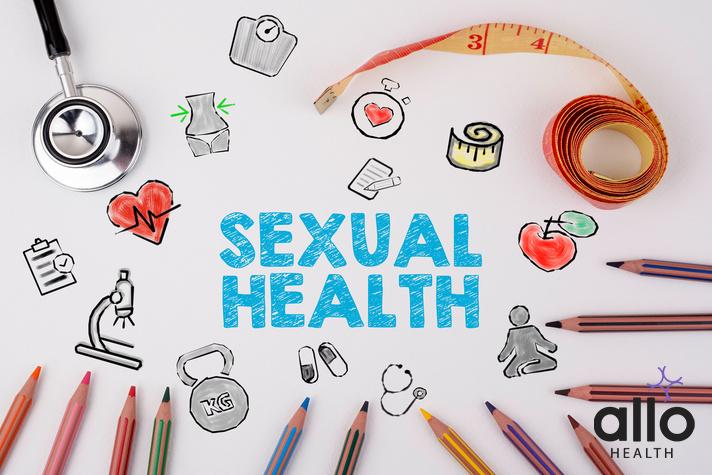Importance Of Sexual Health

Allo Health is dedicated to personalized well-being, offering support and trusted information tailored to individual health goals. The platform emphasizes human-generated content, led by a distinguished medical team of experts, including physicians and sexual health specialists. Their commitment to credibility involves rigorous fact-checking, authoritative research, and continuous updates to ensure accurate, up-to-date information. Allo Health's unique approach goes beyond conventional platforms, providing expert-led insights and a continuous commitment to excellence, with user feedback playing a crucial role in shaping the platform's authoritative voice.

Dr Thanushree, has her MBBS from Kanachur Institute of Medical Sciences, Mangalore
Why This Was Upated?
Our experts continually monitor the health and wellness space, and we update our articles when new information became available.
Updated on 10 February, 2025
- Article was updated as part of our commitment to diversity, equity, and inclusion.
Sexual health is an integral part of overall well-being that is often overlooked or stigmatized in society. It encompasses not just the physical aspects of sexuality but also the emotional, mental, and social dimensions. Maintaining good sexual health is essential for living a fulfilling and healthy life. In this article, we will explore the importance of sexual health and its various facets.
Understanding Sexual Health The World Health Organization (WHO) defines sexual health as “a state of physical, emotional, mental, and social well-being in relation to sexuality; it is not merely the absence of disease, dysfunction, or infirmity.” This broad definition highlights the multifaceted nature of sexual health, which goes beyond just the physical aspects of sexual activity and reproduction. It recognizes that sexual health is deeply intertwined with an individual’s overall well-being, affecting various aspects of their life.
Physical Health Benefits
One of the most evident reasons for prioritizing sexual health is its impact on physical well-being. Practicing safe sex through the use of barrier methods, such as condoms, and regular testing can significantly reduce the risk of contracting and spreading sexually transmitted infections (STIs). Many STIs, if left untreated, can have serious health consequences, including infertility, chronic pain, and an increased risk of certain cancers. By taking proactive steps to prevent and promptly treat STIs, individuals can safeguard their physical health and reduce the burden on healthcare systems.
Additionally, good sexual health practices contribute to positive reproductive outcomes and family planning. This includes using effective contraception methods to prevent unintended pregnancies and seeking prenatal care for healthy pregnancies and deliveries. Regular check-ups and open communication with healthcare providers can also aid in the early detection of sexual health issues, such as cancers or reproductive organ abnormalities, allowing for timely treatment and better health outcomes.

Emotional and Mental Health Benefits
Sexual health has a profound impact on emotional and mental well-being. A healthy attitude towards sexuality and a positive body image can boost self-confidence and overall emotional well-being. Individuals who feel comfortable and accepting of their bodies and sexuality are more likely to engage in fulfilling and consensual sexual relationships, which can foster intimacy and emotional connection.
Furthermore, engaging in safe and consensual sexual activity can be a natural stress reliever, promoting relaxation and the release of feel-good hormones like oxytocin and endorphins. This can have a positive impact on mental health by reducing anxiety and improving overall mood and well-being.
Healthy sexual relationships can also foster emotional intimacy and strengthen bonds between partners, leading to greater relationship satisfaction and overall happiness. Open communication, trust, and respect are essential components of a healthy sexual relationship, and these qualities can spill over into other aspects of life, contributing to improved mental health and overall well-being.
Social and Cultural Aspects
Sexual health has significant social and cultural implications. Promoting open and honest dialogue about sexual health can help destigmatize the topic and encourage people to seek information and support when needed. This can lead to increased awareness, better access to resources, and ultimately, improved sexual health outcomes for individuals and communities.
Moreover, addressing sexual health issues, such as gender-based violence, unintended pregnancies, and access to contraception, can contribute to promoting gender equality and empowering individuals to make informed choices about their sexual lives. By acknowledging and addressing the unique challenges faced by different genders and sexual orientations, we can work towards creating a more inclusive and supportive environment for all.
It is also crucial to understand and respect cultural and religious beliefs surrounding sexuality while promoting evidence-based sexual health education and services. By fostering an environment of cultural sensitivity and open dialogue, we can bridge gaps in understanding and ensure that everyone has access to accurate and relevant information.

24x7 AI backed chatbot for all your sexual health related queries
Comprehensive Sexual Education
Sexual education plays a vital role in promoting sexual health from an early age. Providing age-appropriate and comprehensive sexual education can lay the foundation for healthy attitudes towards sexuality and equip individuals with the knowledge and skills to make informed decisions.
Evidence-based sexual education curricula should cover a wide range of topics, including anatomy, puberty, contraception, consent, relationships, and prevention of sexually transmitted infections. These curricula should be designed to promote healthy relationships by addressing issues like communication, respect, and consent, fostering healthy dynamics, and preventing sexual violence and coercion.
Early and comprehensive sexual education can empower individuals to take charge of their sexual health, make informed choices, and develop healthy relationships. It can also contribute to reducing unintended pregnancies, decreasing the spread of STIs, and promoting overall well-being.

Access to Sexual Health Services
Ensuring access to sexual health services is crucial for maintaining good sexual health. These services should be widely available and accessible to all individuals, regardless of their socioeconomic status, location, or other factors. This includes services such as STI testing, contraception, and counseling.
Creating a safe and non-judgmental environment where individuals feel comfortable seeking sexual health services without fear of stigma or discrimination is essential. Healthcare providers should adopt a confidential and respectful approach, acknowledging the diverse needs and experiences of their patients.
Furthermore, providing comprehensive sexual health services that address not just the physical aspects but also the emotional, mental, and social dimensions of sexual health is key. This may involve counseling services, support groups, and educational resources to help individuals navigate the complexities of sexual health and relationships.
Challenging Stigma and Misinformation
Despite its importance, sexual health is often shrouded in stigma and misinformation. Combating myths and misconceptions surrounding sexual health through evidence-based education and awareness campaigns is crucial. This can help dispel harmful beliefs and promote accurate information that empowers individuals to make informed choices about their sexual health.
Additionally, promoting inclusive representations of diverse sexualities, gender identities, and relationships in media and educational materials can help normalize and destigmatize sexual health issues. By challenging stereotypes and providing accurate and inclusive information, we can create a more accepting and supportive environment for everyone.
Fostering open and respectful conversations about sexual health within communities, families, and social circles is also essential. By creating a safe space for dialogue, we can address concerns, share accurate information, and promote a culture of understanding and acceptance.
Promoting Consent and Healthy Relationships
Consent is a fundamental aspect of sexual health and healthy relationships. Emphasizing the importance of enthusiastic, ongoing, and freely given consent in all sexual encounters is crucial. Providing education on how to communicate and respect boundaries can help prevent sexual violence and promote healthy, consensual relationships.
Recognizing and addressing unhealthy relationship dynamics, such as coercion, manipulation, and abuse, is also essential. Educating individuals on these issues and providing resources for support and intervention can help prevent harm and promote healthy relationships.
Furthermore, promoting values of mutual respect, equality, and open communication within relationships is vital for maintaining healthy and fulfilling sexual and emotional connections. These values can contribute to building trust, fostering intimacy, and creating a positive environment for sexual and overall well-being.
Addressing Specific Health Concerns
Sexual health encompasses a wide range of specific health concerns that require attention and support. Providing resources and support for individuals experiencing sexual dysfunctions, such as erectile dysfunction, low libido, or pain during intercourse, can help them address these concerns and improve their overall sexual health.
Offering comprehensive care and support for individuals facing reproductive health issues, such as infertility, menstrual irregularities, or pregnancy-related concerns, is equally important. This may involve medical treatment, counseling, and access to resources to help individuals navigate these challenges.
Additionally, acknowledging the interplay between mental health and sexual health is crucial. Mental health conditions, such as anxiety, depression, or trauma, can impact an individual’s sexual well-being. Providing resources and support to help individuals navigate these issues and their effects on sexual health can promote overall well-being.
Promoting Self-Care and Healthy
Self-care and healthy habits play a significant role in maintaining good sexual health. Encouraging self-exploration and body positivity can help individuals develop a healthy relationship with their bodies and sexuality. This can involve practices such as mindfulness, self-affirmations, and engaging in activities that promote self-acceptance and confidence.
Emphasizing the importance of stress management and self-care practices, such as exercise, mindfulness, and relaxation techniques, can also contribute to overall well-being and sexual health. Chronic stress can negatively impact sexual function, libido, and overall well-being, making it essential to prioritize self-care and stress management strategies.
Additionally, addressing the potential impact of substance abuse on sexual health is crucial. Substance abuse can impair decision-making, increase risk-taking behavior, and contribute to potential physical or emotional harm. Providing education and resources on substance abuse prevention and treatment can help promote safer and healthier sexual practices.
Sexual health is a vital aspect of overall well-being that deserves attention and prioritization. By promoting comprehensive sexual education, challenging stigma and misinformation, ensuring access to sexual health services, and fostering an environment of consent, respect, and healthy relationships, we can create a society that supports and celebrates sexual health in all its dimensions. Investing in sexual health not only benefits individuals but also contributes to the overall well-being of communities and societies.
The following blog article provides general information and insights on various topics. However, it is important to note that the information presented is not intended as professional advice in any specific field or area. The content of this blog is for general educational and informational purposes only.
Book consultation
The content should not be interpreted as endorsement, recommendation, or guarantee of any product, service, or information mentioned. Readers are solely responsible for the decisions and actions they take based on the information provided in this blog. It is essential to exercise individual judgment, critical thinking, and personal responsibility when applying or implementing any information or suggestions discussed in the blog.



